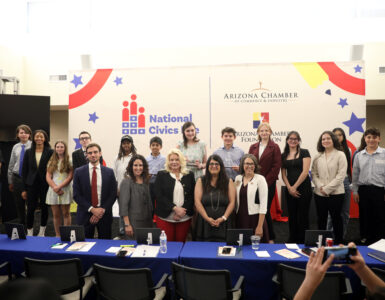Arizona’s new high income tax from Proposition 208 is bound to discourage new investment, harm thousands of small businesses, and is unconstitutional, two of the state’s leading economic and legal experts told the real estate community last week.
While the tax is intended to provide funding for education, it is flawed in many aspects and will hurt education in the long run if measures aren’t taken to mitigate its impacts, said Jim Rounds, an economist and policy analyst who spoke at a virtual breakfast meeting of the nonprofit Valley Partnership, the voice of the real estate industry in the metro Phoenix region.
“We’re not debating education funding. We’re talking about the best way to fund education,” Rounds of Rounds Consulting in Tempe told a group of more than 175 attendees. “We want to make sure the gains are bigger than the economic losses.”
Rounds was joined by constitutional attorney Jon Riches of the Goldwater Institute, which is challenging the tax in Maricopa County Superior Court. Riches detailed why the measure is unconstitutional on several fronts.
Businesses seeking solutions
Cheryl Lombard, president and CEO of Valley Partnership, said the organization invited the two experts so members could get more information about the controversial measure.
Lombard said her organization supports a “well educated workforce” as part of its strategic plan and is joining with other business organizations to determine what is the best path moving forward. If Prop. 208 is not going to deliver as promised or is invalidated by the courts, the real estate community wants to know that there is a path forward that businesses can support.
“As a business community, we need to come together as a collective voice, one voice,” she said.
Highest income tax hike in state history
Proposition 208 almost doubled the marginal income tax rate for individuals who earn $250,000 or more, and couples earning $500,000 or more, from 4.5 to 8.0 percent, a 77.7 percent increase.
It also will impact thousands of small businesses with 500 or fewer employees that file their taxes as individuals, not corporations. Meanwhile, the measure does not affect large companies that file under the corporate tax code.
At the breakfast meeting, Rounds discussed economic implications while Riches outlined the legal problems with the new tax.
Here are highlights from each:
What are the economic impacts of Prop. 208?
Rounds, who conducted an analysis of the new tax with the Goldwater Institute, said that any benefits to education will be offset by the damage it will do to the overall economy.
For one, high income earners are not a stable funding source, he said. Their income flow tends to be more “volatile.”
To determine the potential impact of the ballot initiative, the analysts calculated the damage including job losses, suppressed wage growth, dampened business recruitment, and harm to the state’s economic base.
Among the key findings:
A minimum of $2.4 billion in state and local tax revenues will be lost As more businesses fail under the weight of the tax hike, job growth and wages will suffer. A conservative economic modeling of the financial impact indicates that a minimum of $2.4 billion in tax revenues will be lost over the next decade.
Cuts to social services, public safety, and higher education The new mandate will cause a minimum of $120 million in lost revenues annually to the state’s general fund. Since the proposition requires any decrease in state revenue to be made up from other sources, this will likely put critical services on the chopping block.
Substantial job losses Under the most conservative scenario, job losses will reach a minimum of 124,000 over the course of 10 years.
A drop in new business expansion The risk to new business attraction and expansion could be as large as a 25 percent reduction.
About half of those affected are small business owners Fifty percent of those whose tax rates are expected to be directly targeted are small business owners.
Why is the new tax unconstitutional?
Riches, of the Goldwater Institute, discussed the legal challenge that is being heard in Maricopa County Superior Court. RIches said the measure is flawed constitutionally for a number of reasons including:
Arizona’s constitution requires limitation on school spending The law illegally exempts itself from expenditure limitations for school districts as set forth in the Arizona Constitution.
The proposition violates constitutional requirement The new law violates the state’s constitutional requirement that any new tax must be approved by a two-thirds majority of the legislature, which it did not.
“No legislation, whether passed by the people or the legislature, can override or supercede the constitution,” Riches said.
The Goldwater Institute is joined by many others in its legal challenge including the leaders of the Arizona Senate and House, Sen. Karen Fann (R-Prescott) and Rep. Rusty Bowers (R-Mesa); several other Republican legislators; Montie Lee, the owner of Lee Farms; cardiologist Francis Surdakowski; and the Arizona Free Enterprise Club.
A separate lawsuit also was filed by small business owner Ann Siner, CEO of My Sister’s Closet, and John Buttrick, a retired Superior Court judge and federal magistrate.
Both experts said Arizona must find a better way to fund education. Legislative leaders in both the Arizona Senate and House are seeking ways to do just that.
Among the solutions under discussion are mitigating the damage from Prop. 208 with tax reforms. No concrete proposals have been introduced but committee chairs in both houses said mitigation is one of their top priorities this year.
















Add comment